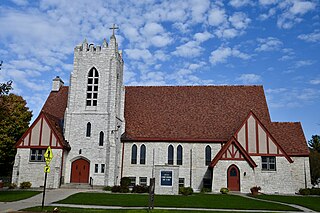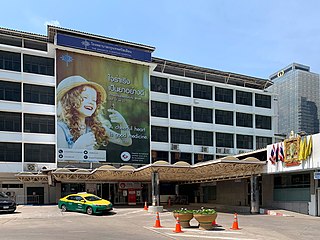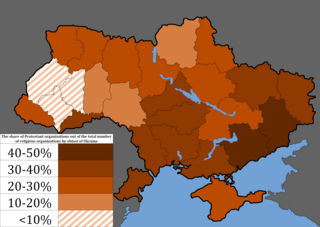Related Research Articles

Seventh Day Baptists are Baptists who observe the Sabbath as the seventh day of the week, Saturday, as a holy day to God. They believe in conscious baptism of believers by immersion, congregational government and the scriptural basis of opinion and practice. They profess a statement of faith instituted on fundamental precepts of belief. Seventh Day Baptists rest on Saturday as a sign of obedience in a covenant relationship with God and not as a condition of salvation. Many, have adopted a Baptist covenant theology, based on the concept of regenerated society.
This timeline of Christian missions chronicles the global expansion of Christianity through a listing of the most significant missionary outreach events.

Congregationalism is a Reformed (Calvinist) tradition of Protestant Christianity in which churches practice congregational government. Each congregation independently and autonomously runs its own affairs. These principles are enshrined in the Cambridge Platform (1648) and the Savoy Declaration (1658), Congregationalist confessions of faith. The Congregationalist Churches are a continuity of the theological tradition upheld by the Puritans. Their genesis was through the work of Congregationalist divines Robert Browne, Henry Barrowe, and John Greenwood.

The Church of Christ in Thailand (C.C.T.) is a Protestant Christian association. It is the largest Protestant denomination in Thailand and is considered to be the largest by group of Protestant members in Thailand.
Protestants in India are a minority and a sub-section of Christians in India and also to a certain extent the Christians in Pakistan before the Partition of India, that adhere to some or all of the doctrines of Protestantism. Protestants in India are a small minority in a predominantly Hindu majority country, but form majorities in the north-eastern states of Meghalaya, Mizoram and Nagaland. They are also significant minorities in Punjab region, Konkan region, Bengal, Kerala and Tamil Nadu, with various communities in east coast and northern states. Protestants can trace their origins back to the Protestant Revolution of the 16th century. There are an estimated 20 million Protestants and 16 million Pentecostals in India.

The "three angels' messages" is an interpretation of the messages given by three angels in Revelation 14:6–12. The Seventh-day Adventist church teaches that these messages are given to prepare the world for the second coming of Jesus Christ, and sees them as a central part of its own mission.

The seventh-day Sabbath, observed from Friday evening to Saturday evening, is an important part of the beliefs and practices of seventh-day churches. These churches emphasize biblical references such as the ancient Hebrew practice of beginning a day at sundown, and the Genesis creation narrative wherein an "evening and morning" established a day, predating the giving of the Ten Commandments. They hold that the Old and New Testament show no variation in the doctrine of the Sabbath on the seventh day. Saturday, or the seventh day in the weekly cycle, is the only day in all of scripture designated using the term Sabbath. The seventh day of the week is recognized as Sabbath in many languages, calendars, and doctrines, including those of Catholic, Lutheran, and Orthodox churches.[a]

Protestants in Thailand constitute about 0.77% of the population of Thailand. Protestant work among the Thai people was begun by Ann Judson in Burma, who evangelized Thai war captives who were relocated to Burma. Protestantism was introduced to the country of Thailand in 1828 through the work of Karl Gutzlaff and Jacob Tomlin, the first two resident Protestant missionaries in Thailand.

It was believed by some scholars that Christianity was first introduced to Thailand by European missionaries. By 2021, there were nearly 1 million Christians in Thailand and represented 1.4% of the predominantly Buddhist national population. Christians are numerically and organizationally concentrated in northern Thailand, where they make up an estimated 16% of the population in some lowland districts and up to very high percentages in tribal districts.

Protestants in Ukraine number about 600,000 to 700,000 (2007), about 2% of the total population. Nearly all traditional Protestant denominations are represented in the country. According to Christianity Today magazine, Ukraine has become not just the "Bible Belt" of Eastern Europe, but a "hub of evangelical church life, education, and missions". At present, the country is a key supplier of missionaries and a center of evangelical training and press printing for all the countries of the former Soviet Union, where the legal environment is not so favourable.
The International Missionary Societyof Seventh-Day Adventist Church Reform Movement (IMSSDARM) is an independent Protestant Christian

Sabbatarianism advocates the observation of the Sabbath in Christianity, in keeping with the Ten Commandments.

christianity was introduced by Spanish settlers who arrived in Jamaica in 1509. Thus, Roman Catholism was the first Christian denomination to be established. Later, Protestant missions were very active, especially the Baptists, and played a key role in the Abolition of Slavery.
The Presbyterian Church of the Philippines (PCP), officially The General Assembly of the Presbyterian Church of the Philippines, is a growing evangelical, Bible-based Reformed church in the Philippines. It was officially founded by in 1986 and the General Assembly was organized in September 1996.

The National Council of Congregational Churches of the United States was a mainline Protestant, Christian denomination in the United States. Its organization as a denomination was delayed by the Civil War. Congregational leaders met again in Boston, Massachusetts in 1865, where they began to hammer out standards of church procedures (polity) and adopted a statement of faith, known as the Burial Hill Declaration. Denominational organization came in 1871 with formation of the National Council of Congregational Churches, which existed until its merger in 1931. In 1928, there were 5,497 Congregational churches in the U.S. with a membership of 939,130. These churches were served by 5,648 ministers.

Scottish Protestant missions are organised programmes of outreach and conversion undertaken by Protestant denominations within Scotland, or by Scottish people. Long after the triumph of the Church of Scotland in the Lowlands, Highlanders and Islanders clung to a form of Christianity infused with animistic folk beliefs and practices. From 1708 the Society in Scotland for Propagating Christian Knowledge (SSPCK) began working in the area. In 1797 James Haldane founded the non-denominational Society for the Propagation of the Gospel at Home. Dozens of lay preachers, divinity students and English preachers were sent to the region. In the early nineteenth century a variety of organisations were formed to support evangelism to the region.
The history of Baptist Christianity in Sichuan began in 1890 when missionaries began arriving from the United States. Baptist missionaries in Sichuan were organized under the American Baptist Missionary Union, later renamed American Baptist Foreign Mission Society. Missionary activity in China generated controversy among many native Chinese and faced armed opposition during both the Boxer Rebellion and the later Communist movement in China. Although the former did not affect Sichuan so much as some other parts of China, the province was one of the hotbeds of anti-missionary riots throughout its ecclesiastical history.
References
- American Presbyterian Mission (1867). Memorials of Protestant Missionaries to the Chinese. Shanghai: American Presbyterian Mission Press.
- Seventh Day Baptist Missionary Society Website (1992). Seventh Day Baptist Missionary Society. USA & Canada.
{{cite book}}: CS1 maint: location missing publisher (link)